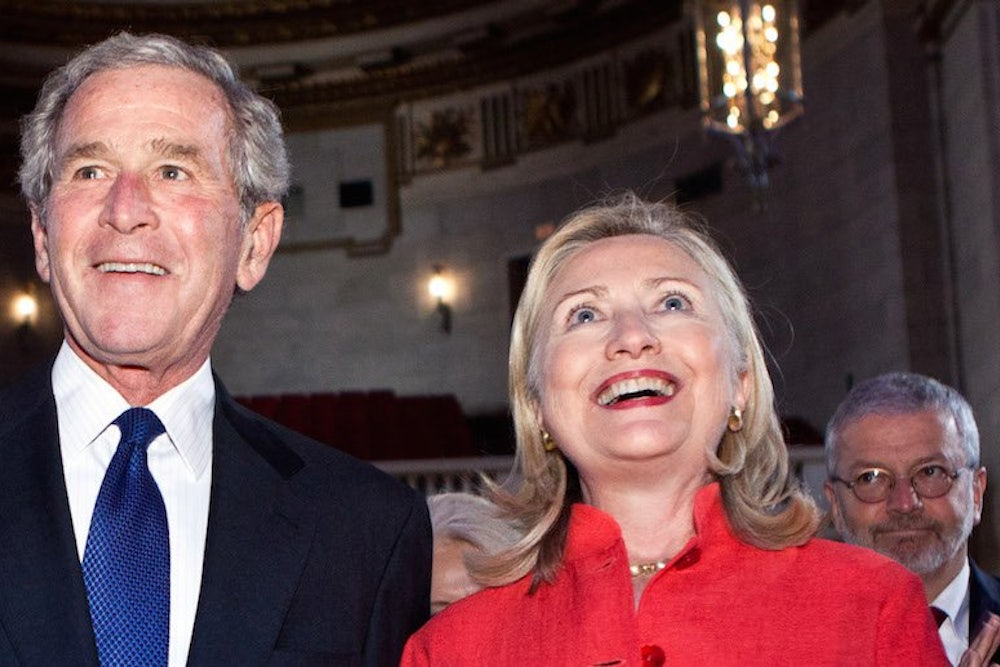Asking Republican presidential candidates whether they would have invaded Iraq, “knowing what we know now,” paid an immediate dividend, insofar as it helped cement historical judgment against the war. But if that’s the end of the line of inquiry, the question has the power to do real damage beyond airy issues of collective memory.
Several writers have made similar points in different ways, James Fallows and Peter Beinart of The Atlantic most effectively: If today’s Republicans can avoid grappling with the Iraq war beyond admitting that it looks like a mistake in retrospect, they can gloss over the extent to which it represented an error in judgment on its own terms and was moreover thrust upon the world, rather than blundered into on the basis of faulty intelligence alone.
To allow these candidates to say, “in hindsight, we shouldn’t have invaded,” and leave it at that is to pull back the rug and open the escape hatch for them. Perhaps some of them regret having invested in Lehman Brothers, too, and yet no reporter would allow that to suffice as a reckoning with decades of financial deregulation leading up to the economic crisis.
But the imperative to dig deeper is greater than to simply prevent people who supported the war until two weeks ago from evading questions about their judgment, and glossing over the ugly historical truth. These Republicans—with the possible exception of Jeb Bush—are thrilled to say they wouldn't have invaded Iraq, not because they take great pleasure in throwing the last GOP president under the bus, but because it will allow them, first in the primary and then in the general election, to attempt the greatest volte-face in the recent history of presidential politics. Having washed their hands of the war and escaped further interrogation about it, they can turn around and attack Hillary Clinton over the Iraq war from the left.
Jeb Bush was the obvious mark for all these Republican mea sorta culpas. His inability to articulate a coherent answer to a predictable and easy question invited the rest of the GOP field to chime in and appear forthright by comparison. But they have a different target in mind as well.
So far Hillary has served only as a crutch for these Republicans. Her early and continued support for the war has allowed them to treat, as a given, the false premise that anyone leading the armed forces in 2002 and 2003 would have authorized the invasion. But eventually, they can use the fact that she alone among contenders served in Congress when the war began to flip the entire ownership structure of the war on its head.
John Feehery, an executive at the D.C. public affairs firm Quinn Gillespie and a former leadership aide to House Republicans, explained how Republicans can execute this reversal.
“Only one current candidate got it wrong when it came to getting into Iraq and then getting out of Iraq,” he wrote, “Hillary Clinton voted for the war, which proved to be a difficult obstacle for her to overcome in the 2008 election. And then she supported Obama when he precipitously pulled out of Iraq before the 2012 election. If there is any one person who has the most to explain when it comes to the rise of ISIS, it’s Clinton.”
Feehery doesn't exist on the outskirts of Republican politics. If he believes today's GOP candidates can turn the history of the Iraq war—now tightly linked to their own party—into a liability for Hillary, then it stands to reason those candidates are getting similar advice directly from their advisers.
The maddening thing about his argument is that it’s both extraordinarily superficial and entirely accurate. By virtue of the nature and timing of her public service, she has encountered many more decision points and influenced more outcomes in Iraq than any Republican currently running for president.
If Republicans had genuinely experienced a thorough ideological cleansing in the years since the invasion, this would be a clean line of attack. It’s certainly a clean line of attack for someone like Bernie Sanders, who genuinely bears no blemishes from the Iraq mess.
But as a functional matter, these Republicans are hiding behind relative inexperience. Had they been members Congress twelve years ago, they would’ve voted for the force authorization. Had they played senior roles in the George W. Bush administration, they would’ve helped orchestrate the war enthusiastically. Most of the war’s architects are still in business. Nearly all of them are working for, or being courted by, Republican candidates.
The bright minds that gave life to the Iraq war weren’t banished from Republican politics—they play an outsized role in the party to this day. They’re crouching for the moment, as Republican candidates ride out the sudden wave of interest in their ability to act as though something blindingly obvious is actually a wise and courageous insight. But if that’s all that’s expected of these Republicans—if they're allowed to tiptoe back into power around the partisan implications of such a huge blunder—the Iraq war framers will be able to re-embed themselves and their ideas into the policymaking firmament, largely undetected.
